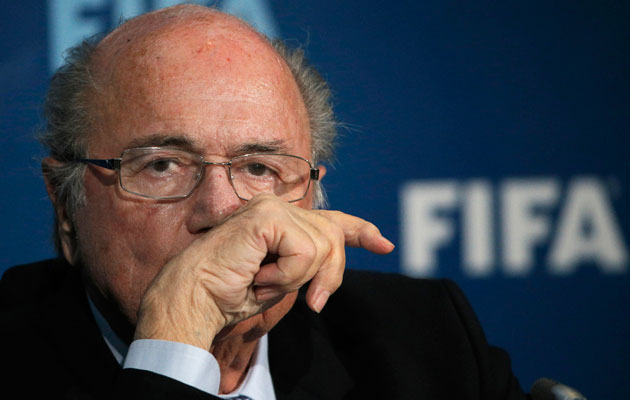Like a Rolls-Royce purring out into the sunshine and accelerating gently onto the long, straight open road, Sepp Blatter cruised out and down his presidential motorway last week.
Blatter is a veteran driver. He has been travelling this route regularly ever since 1998. That was his toughest election campaign because it was the first and he needed nerves of steel and an awful lot of help to edge over the line ahead of Lennart Johansson.
Four years later came a test of a different sort as Blatter’s presidency rode the punches delivered by the collapse of ISL. Europe ran African confederation president Issa Hayatou against Blatter but when it’s Europe against the Rest of the World then Europe is always the loser. Just do the maths.
FIFA elections were then pushed, sensibly, out of World Cup year. Blatter cavorted happily back into power in 2007 and even in 2011 after the conveniently-timed capture of Mohamed bin Hammam’s hand in brown-paper envelopes removed the only rival.
Blatter, re-elected, stood at the congress podium in Zurich and promised, firstly, his own ultimate departure and, secondly, reform.
As for the one, Blatter is not the first politician to renege on a promise and he will not be the last. On the second some reforms have been undertaken though it will take another president (maybe some time in the dim and distant future) to capitalise.
The one reform proposal whose collapse Blatter ensured was that of age and term limits. This is now working to his very particular advantage.
January 29 was the deadline for presidential campaign nominations. Blatter waited until late in the day to issue a simple statement confirming his submission. No need of a noisy campaign launch; no need of supporters’ quotes; no need of an idealistic manifesto; no need of angry words.
As incumbent president Blatter could afford to look down from the hills above Zurich and take a benevolent view of the scramble out in the streets.
In any election the incumbent has inbuilt advantages. One is the status provided by the mere cloak of the presidency; another is the opportunity to fulfil presidential duties, enact presidential powers, without ever needing to behave as a campaigner. Unspoken awareness is everything.
Hence Blatter flew off to Equatorial Guinea last week for the final stages of the African Nations Cup. Here he signed a Memorandum of Understanding between FIFA and CAF for the future provision of development support and across-the-board instructional courses. All very proper for the president . . . and very positive for a campaigner seeking African votes.
Next came an opportunity to speak up in defence of African football against the naughty western media which was always, apparently, seeking to patronise and criticise. Such words were guaranteed to go down well and were duly endorsed by Hayatou who reminded his constituency that Europe’s media was seeking to perpetuate the outdated yoke of colonialism.
These were sentiments which reverberated to approval across not only Africa but throughout the developing world.
Blatter may carry on because FIFA Congress, last year, trampled underfoot a reform proposal from governance expert Mark Pieth for age and term limits.
Here was Blatter’s political skill. Pieth had proposed term limits for FIFA alone. That was his brief. But Blatter, from the outset, insisted that if term limits should be enacted within FIFA then it was only fair and proper they be enforced throughout world football.
No surprise, then, that the self-perpetuating gerontocracy which runs so many national associations wanted nothing of the sort. Hence no age and term limits.
No-one knows and understands and can work the FIFA constituency like Blatter. Hence he can go on and on. And not only Blatter. Hayatou, 68, wants CAF to scrap its age limit of 70 so that he, too, can go on and on. Thanks to Blatter’s tactical foresight which is being rewarded with Hayatou’s election-year support.
Quite why Blatter wants to carry on into eternity is uncertain. After all, even in retirement he would be guaranteed the five-star (or even seven-star) luxury of a FIFA grandee and he could negotiate an amnesty against any unpleasant revelations arising from his reign.
Blatter says he is on a mission. Perhaps he believes that the longer he stays in office the further issues such as ISL and the Qatar vote will recede into the dim and distant past and he will be granted the respect he feels has been denied him, certainly within Europe.
So he cruises on serenely towards May 29. The only bump in the road is UEFA Congress in mid-March in Vienna. Blatter will be there in his role as president of FIFA; he will avoid awkward questions about elections; he will also heed the lesson from last June.
In Sao Paulo Blatter was visibly discomfited that his triumphant tour of all the confederations’ mini-congresses was spoiled by his harsh treatment from UEFA. For a few minutes the guard dropped. Blatter snapped irritably about “a lack of respect.”
At that moment he was very definitely not very presidential.
Hence he will take a deep breath and then go to Vienna with a firm handshake, a polite smile, ear plugs and his Swiss army tin hat. Since UEFA Congress is comparatively early, Blatter will then have a full two and a half months of photo-opportunities to project a smiling confident, commanding image as FIFA president (and, by the way, campaigner).
He has no need to respond to the criticisms of Prince Ali or Michael Van Praag or Luis Figo. Blatter is in the fast lane towards re-election and believes he cannot be overtaken . . . unless, of course, he takes his own eye off the road.







